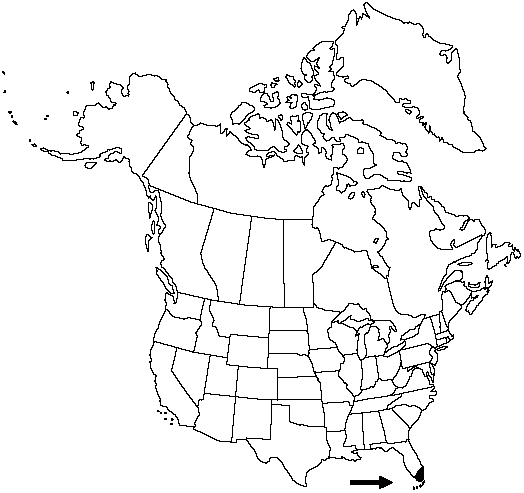Asplenium trichomanes-dentatum
Sp. Pl. 2: 1080. 1753.
Roots proliferous. Stems erect, unbranched; scales blackish throughout, linear, 0.9–1.1 × 0.2–0.3 mm, margins entire. Leaves dimorphic; sterile leaves short with small crowded pinnae; fertile leaves 9–20 cm with long, widely spaced pinnae. Petiole pale green except darkish proximally, dull, (1–) 4–6 (–10) cm, 1/5–1/2 length of blade; indument absent. Blade linear, 1-pinnate, 3–10 (–15) × 1–2.5 cm, papery, slightly glandular; base not tapered; apex with elongate terminal pinna similar in size to subtending lateral pinnae, not rooting. Rachis green throughout, dull, glabrous. Pinnae in 5–8 (–12) pairs, ovate, strongly asymmetric, lanceolate; medial pinnae 3–11 × (2–) 4–6 mm; base acute; margins crenate-dentate; apex truncate. Veins free, somewhat evident. Sori (1–) 2–5 (–8), mostly on acroscopic side. Spores 64 per sporangium. 2n = 108.
Habitat: Shady hammocks, on walls of limesinks, moist limestone rocks, rocky banks of streams
Elevation: 0–50 m
Distribution

Fla., s Mexico, West Indies in the Antilles, Central America, South America in Colombia, Venezuela
Discussion
In the flora Asplenium trichomanes-dentatum is known only from shady hammocks in extreme southern peninsular Florida, where it grows in colonies. This delicate spleenwort should be studied in detail and compared with its similar and apparently conspecific counterparts in tropical America.
Selected References
None.
Lower Taxa
"/5lengthofblade" is not declared as a valid unit of measurement for this property.